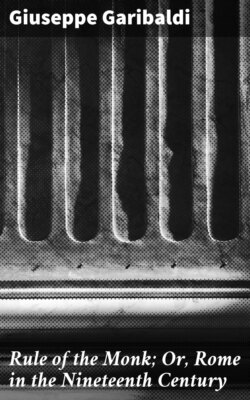Читать книгу Rule of the Monk; Or, Rome in the Nineteenth Century - Garibaldi Giuseppe - Страница 20
На сайте Литреса книга снята с продажи.
CHAPTER XIII. THE BEAUTIFUL STRANGER
ОглавлениеTable of Contents
Rome is the museum of the fine arts, the curiosity-shop of the world. There are collected the ruins of the ancient societies, temples, columns, statues, the remains of Italian and Grecian genius, chefs-d'ouvre of Praxiteles, Phidias, Raphael, Michael Angelo, and a hundred masters. Fountains, from which arise marine colossi, chiefly, alas, in ruins, meet the eye on all sides. The stranger is struck with amazement and admiration at the sight of these gigantic works of art, upon many of which are engraved the mighty battles of a wonderful by-gone age. It is not the fault of the priest if their beauty is not marred by endless mitres and superstitious signs. But they are still marvellous and beautiful, and it was among them that Julia, the beautiful daughter of Albion, was constantly to be found. She had resided for several years in this city of sublime memorials, and daily passed the greater part of her time in sketching all that to her cultivated taste appeared most worthy of imitation and study. Michael Angelo was her especially favored maestro, and she might frequently be seen sitting for hours before his colossal statue of Moses, rapt in the labor of depicting that brow, upon which, to her vivid imagination, sat an air of majestic greatness that appeared almost supernatural. Born and bred in free and noble England, she had separated herself voluntarily from loving and beloved friends, that she might thus wander undisturbed among the objects of her idolatry. Unexpectedly, her pursuits had been interrupted by a stronger feeling than art. She had encountered Muzio many times in the studio of the sculptor Manlio, and, poor and apparently low as he was, Julia had found under the ragged garb of a mendicant her ideal of the proud race of the Quirites.
Yes, obscure though he was, Muzio was beloved by this strange English girl. He was poor, but what cared she for his poverty.
And Muzio, did he know and return this generous love?
Yes, in truth; but, although he would have given his life to save hers, he concealed all consciousness of her interest, and allowed not a single action to betray it, though he longed fervently for occasion to render her some trifling service, and the opportunity came. As Julia was returning from Manlio's studio, some few days before his arrest, accompanied by her faithful old nurse, two drunken soldiers rushed upon her from a by-way, and dragged her between them some little distance, before Muzio, who secretly kept her in view during such transits, could come to her succor. No sooner had he reached them, than he struck one ruffian to the earth, seeing which, his fellow ran away. The terrified Julia thanked him with natural emotion, and besought him not to leave them until they reached their own door. Muzio gladly accepted the delicious honor of the escort, and felt supremely happy when, at their parting, Julia gave him the favor of her hand, and rewarded him with a priceless smile. From this evening Muzio's dagger was consecrated to her safety, and he vowed that never again should she be insulted in the streets of Rome.
It befell that the same day upon which Silvia went to the palace Corsini to present her petition, Julia was paying one of her visits to the studio. Arriving there, she was informed by a lad in attendance of all that had occurred. Whilst pondering over the ominous tale, Attilio entered in quest of the ladies, and from him the English girl learned the particulars of Manlio's escape. His narration finished, Julia, in turn, recounted to him the views that the youth had imparted to her concerning the presentation of the petition.
Attilio was much distressed, and could with difficulty be restrained from going directly to the palace in search of Silvia and her daughter. This would have been very imprudent, and therefore Julia offered, as she had access at all times to the palace, to go to the Cardinal's house, and ascertain the cause of the now prolonged absence of the mother and daughter, promising to return and tell him the result.
Attilio, thoroughly spent with excitement and fatigue, yielded to Spartaco's invitation to take some rest, whilst the boy related to him the particulars of what had passed since he left them to carry out the rescue of his friend.
